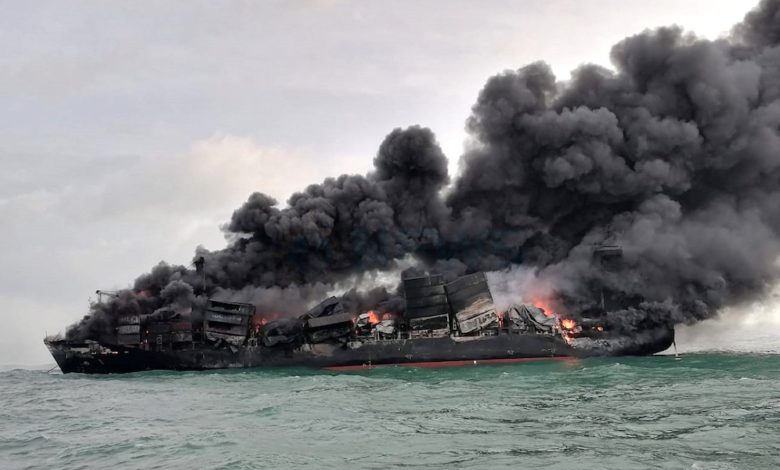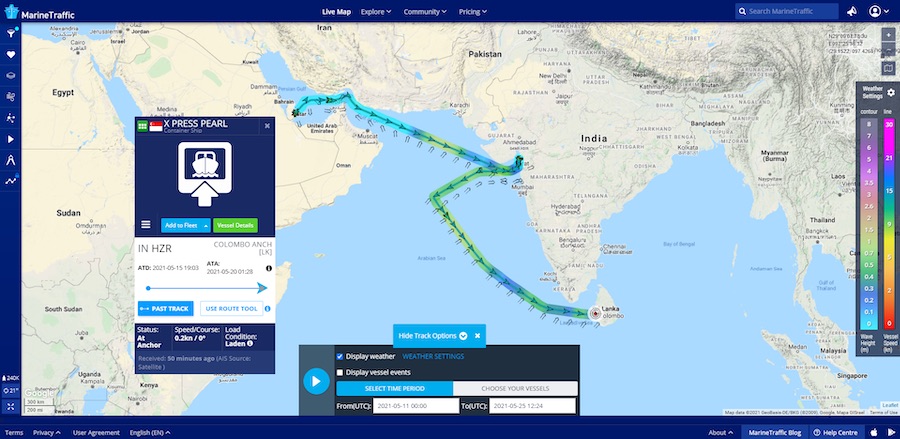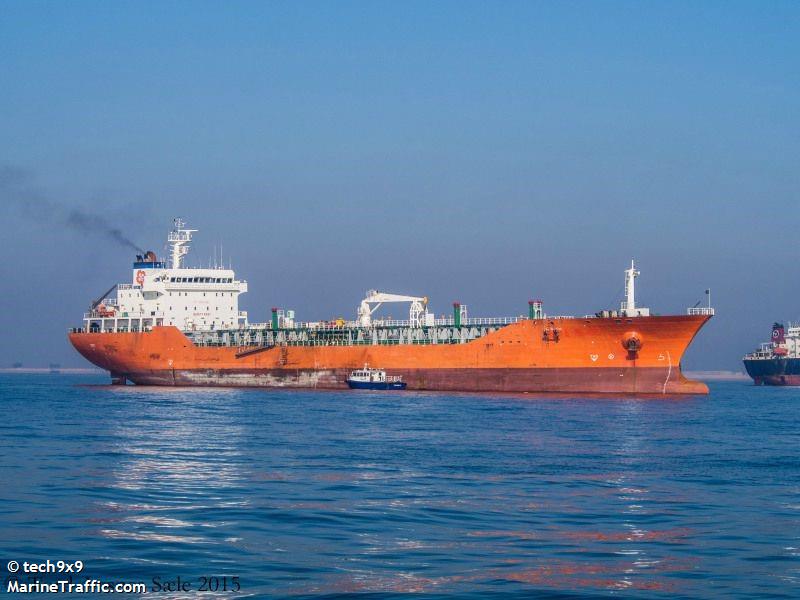X-Press Pearl was not allowed to offload leaking box in India and Qatar prior to Sri Lanka call

The burning ship at the centre of an environmental catastrophe off Sri Lanka was not allowed to offload boxes with leaking acid at two ports, Splash can exclusively reveal.
Fire has ravaged the entire length of the three-month-old, 2,700 teu X-Press Pearl with its owner now accepting a constructive total loss is inevitable.
The ship, which caught fire while at anchorage off Colombo last Thursday, suffered an explosion yesterday, necessitating the swift evacuation of the crew. General Average has been declared on the X-Press Feeders ship, which was carrying around 25 tons of acid among the 1,486 containers onboard.
It was a case of not in my backyard syndrome
Debris from the burning containership has washed ashore and locals have been warned not to touch any of it as it could be contaminated with harmful chemicals.
The full story of how the ship came to meet its likely fiery end in Sri Lanka has overtones of previous ship catastrophes such as the 2002 Prestige tanker incident and will likely fan the flames in the ongoing places of refuge debate.
Speaking with Splash today from Singapore, Tim Hartnoll, the executive chairman of X-Press Feeders, said that poor packaging was responsible for the acid leak, which the crew had detected while in the Arabian Sea thousands of kilometres away from Sri Lanka. On detecting the leak, the ship’s captain then contacted two ports – Hazira on the west coast of India and Hamad in Qatar – requesting to offload the containers in question. The requests were denied and the ship, which was delivered from a yard in China this February, made its way to Sri Lanka.
“It was a case of not in my backyard syndrome,” Hartnoll said.
While salvage teams – assisted by Sri Lankan and Indian military forces – fight to minimise damage, acid and fuel is thought to have spilled into the sea, and the ship’s owner is anticipating the London P&I Club-insured vessel will be declared a total loss.
“The biggest threat to container shipping is fire onboard on ships,” Hartnoll said.
A separate source at the company commented: “This disaster could have been prevented had those ports done their duty and taken in the cargo rather than endangering the crew and the ship.”
A report from maritime insurer Gard last November warned a fire involving containerised cargo now happens once every two weeks on average.
Gard’s report outlined three main reasons for the fires seen historically. Ranked first is self-heating charcoal. Ranked second is chemicals incorrectly packaged and/or declared with batteries listed as the third biggest cause of fires in containers at sea.


 with its owner now accepting a constructive total loss is inevitable.
with its owner now accepting a constructive total loss is inevitable.
why countries doesn’t help during emergencies.looks like seafarers lives is very cheap.
seafarers lives are not valued even by their on companies,also other countries…its a shame to UN,shame to IMO for this…third world countries like india make the seafarers life even more difficult with there crap procedures about study/certifications and look at countries like Singapore/Ukraine who have no standards of exam level….IMO is garbage,so is STCW…only for few who screw there own people.
Ther are many reasons to it :
1. Liabilities. The help turns into a liability right from health to political conflicts.. who will pay as every thing needs to be paid for including the bottle of water to the escort provided until the flight
2. Why should one pay unless there is a common interest or gesture of goodwill.
3. After all it’s all about money or political alliance
4. Lastly no one cares any more as today the world is divided by borders of nations who have humans but behave like animals.
They should have helped..Now see the danger 😪😪 environmental issues and life underwater 🔥🐟
Looks like there is not protocol when it comes to vessel emergency. Its a rogue industry. It better be controlled sooner.
Who are the local agents ?
everyone playing better safe than sorry, Sri lanka wanted to see if it hit the jackpot
@nihar. Dont talk crap! The crew begged for their lives and Sri Lanka let them enter port….. and the rest is history!
@nihar, yeah don’t be an idiot. Do you want to be burnt in a fiery vessel and buried in sea? If the Indians are so capable why didn’t they attended the ship’s request? While everyone did “not in my backyard thing”, Sri Lanka did the most humane thing.
very easy for the Owners to blame qatar and india, but if the P&I club does not provide guarantees (which the owners shud help arrange!) there is no point pinning game on countries for it can very well lead to a Lebanon like blast! We are not even going into the issue of the Crew messing up in picking up a IMDG cargo….
DG misdeclaration to reduce FAK freight cost has been part of door/door container movements forever. Random container inspections by customs at export terminals should be mandatory requirements under ISPS and IMDG Codes. The cost should be recovered via the THC.
On its initial observation and request, the near ports should have assisted, fire was so much at the base level. But next 4/5 days and open to sea it started to spread fast.
Shipowners must ensure 100% application of the standard procedure for IMCO cargo. It is also important to know the history of shippers. 2 years ago we have seen the disaster on the Maersk Honam Line ship but lesson learnt.
Ok. Lets assume a aircrafts with a technical problem rejected to land at nearest airport. Dont you see any similarities
Respect Sri Lanka! I know there are very good people.
Thank you. But typical opposition is taking the opportunity to brain wash majority that the government purposely let our environment get polluted in the greediness of compensation receive from the ship owners
That is what happens when senior (I mean old) politicians say “We’ll get compensation running into billions of dollars” as if they do not mind an environmental disaster as long as we get foreign exchange!
We did not see any senior politician in government mentioning such compensation in dollars focusing extra foreign exchange. In any country there is a minority who see fault of everything. Yet politicians in the opposition were seen making allegations. The issue is this region and specially SL has no proper legal framework and exact equipment to absorb such a disaster… still. Past politics are to blame. I don’t about future. Now that the ship is sinking, the massive damage to environment, people and economy is unimaginable. As a region, the countries of SAAF must get together to form a proper legal framework to demand same or more compensation for such marine disasters as in the west. Also to have state of the art salvage machinery in place in the region.
Does anyone know if the container carrying nitric acid was a dry box container or an Isotank?